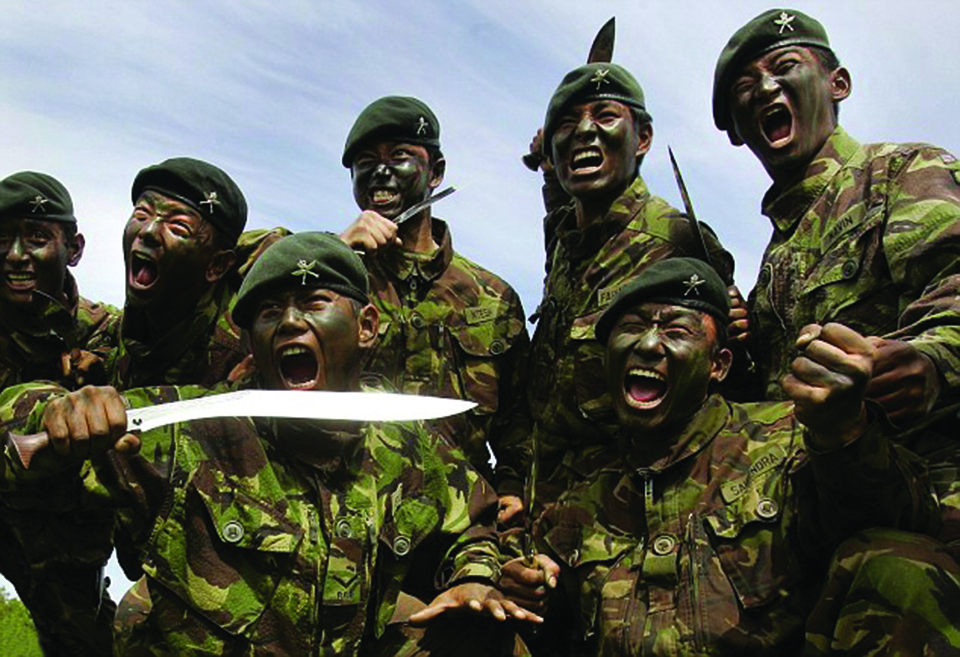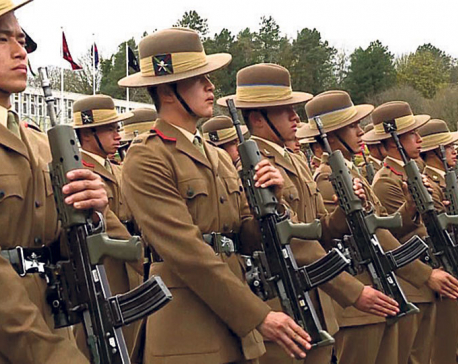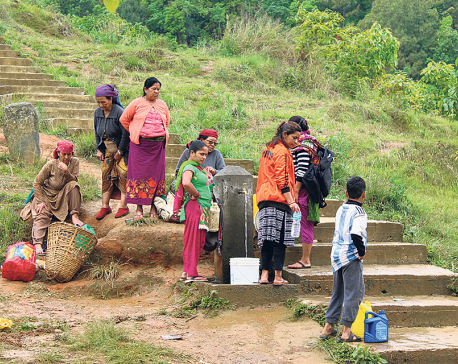
OR
Ex-Gurkhas threaten to disrupt recruitment process
Published On: February 21, 2019 08:55 AM NPT

KATHMANDU, Feb 21: A senior official representing the ex-British Gurkhas said Wednesday that they turned down ‘an offer’ from the British government for a marginal hike in their perks and benefits, saying that the offer still discriminates against Nepali serviceman who have long been struggling to gain equal status in the British Army.
In November, the British government had offered to increase perks and benefits of the Gurkha pensioners by 10 to 34 percent depending on the position they held in the British Army. According to sources, the offer was conveyed to Former Gurkhas Joint Satyagraha Struggle Committee (FGJSSC), an umbrella association of seven ex-British Gurkhas’ organizations, through the Ministry of Foreign Affairs on February 12.
“Such tokenism won’t work anymore. We want the same treatment that our British counterparts are receiving,” said SB Ghising, general secretary of the Former Gurkhas Joint Satyagraha Struggle Committee.
The FGJSSC has threatened to disrupt recruitment of Nepalis in the British Army if their demands are not met by March, 2019. The warning from the ex-Gurkhas’ organizations comes just ahead of the British Minister of State for the Armed Forces Mark Lancaster’s four-day Nepal visit. Lancaster, who was scheduled to arrive in Kathmandu on Wednesday, will hold talks with senior Nepali officials to solve the Gurkha problem.
“We are left with no option but to give a deadline to complete this demand by March 18, 2019. Otherwise, we have to consider other options and we cannot rule out another hunger strike in the UK as well as the termination of the tripartite agreement and the recruitment of Gurkhas. The British government should shoulder this blame as they have been inflexible,” reads an ultimatum addressed to the British Prime Minister Theresa May.
The FGJSSC has put forth a 4-point demand which among other things call for equal perks and benefits. Nepalis working in the British Army have been receiving a fraction of what their British counterparts are getting. The ex-Gurkhas have also demanded a scrapping a discriminatory provision wherein widows of Nepali servicemen are paid 40 percent less than widows of servicemen having British citizenship. Other demands include medical benefits for servicemen in Nepal and guarantee of an unconditional resident visa to children of former soldiers.
Ghising said that a resolution of the Gurkha problem should be based on the technical tripartite agreement prepared by a team of representatives constituting the British and Nepali officials and representatives of the ex-Gurkhas’ organizations in March, 2018.
“Both Nepal and Britain should make sincere efforts to find solution based on that report if they are serious about a permanent solution to the Gurkha problem. We haven’t yet seen that kind of sincerity,” said Ghising. He also accused the Ministry of Foreign Affairs of keeping pensioners in the dark about negotiations with the British government.
But a senior MoFA official said that there was no truth in the allegation. The official said that the ministry has been regularly briefing servicemen about the progress in negotiations with the British government.
“The fact that Foreign Minister (Pradeep Gyawali) had held more than a dozen meetings with servicemen in the last one year tells a lot about our sincerity. The ministry won’t accept any deal that is not acceptable to the servicemen’s organizations,” said the MoFA official.
Pressure is mounting on the government to address the Gurkha problem with several influential MPs expressing solidarity with the Gurkhas’ cause. The parliamentary committee on labor and international relations has directed the government to ensure equal treatment for Nepalis working in the British Army.
You May Like This

Gurkha pensioners threaten to obstruct British Army recruitment
KATHMANDU, Jan 4: The British Gurkha Satyagraha United Struggle Committee, which has been agitating for over a year demanding equal... Read More...

Feast and fun in country side
It’s no sin to turn your back to the sun occasionally even if you worship it. It behooves well to... Read More...



Just In
- 352 climbers obtain permits to ascend Mount Everest this season
- 16 candidates shortlisted for CEO position at Nepal Tourism Board
- WB to take financial management lead for proposed Upper Arun Project
- Power supply to be affected in parts of Kathmandu Valley today as NEA expedites repair works
- Godepani welcomes over 31,000 foreign tourists in a year
- Private sector leads hydropower generation over government
- Weather expected to be mainly fair in most parts of the country today
- 120 snow leopards found in Dolpa, survey result reveals







_20220508065243.jpg)








Leave A Comment